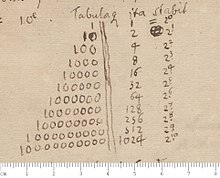| ||||
|---|---|---|---|---|
| Cardinal | one thousand twenty-four | |||
| Ordinal | 1024th (one thousand twenty-fourth) | |||
| Factorization | 210 | |||
| Divisors | 1, 2, 4, 8, 16, 32, 64, 128, 256, 512, 1024 | |||
| Greek numeral | ,ΑΚΔ´ | |||
| Roman numeral | MXXIV | |||
| Binary | 100000000002 | |||
| Ternary | 11012213 | |||
| Senary | 44246 | |||
| Octal | 20008 | |||
| Duodecimal | 71412 | |||
| Hexadecimal | 40016 | |||

1024 is the natural number following 1023 and preceding 1025.
1024 is a power of two: 210 (2 to the tenth power).[1] It is the nearest power of two from decimal 1000 and senary 100006 (decimal 1296). It is the 64th quarter square.[2][3]
1024 is the smallest number with exactly 11 divisors (but there are smaller numbers with more than 11 divisors; e.g., 60 has 12 divisors) (sequence A005179 in the OEIS).
- ^ Bryan Bunch, The Kingdom of Infinite Number. New York: W. H. Freeman & Company (2000): 170
- ^ Sloane, N. J. A. (ed.). "Sequence A002620". The On-Line Encyclopedia of Integer Sequences. OEIS Foundation. Retrieved 2024-01-21.Preview warning: Page using Template:Cite OEIS with unknown parameter "Quarter-squares: a(n)"
- ^ Denis Roegel. (2013). A reconstruction of Bürger's table of quarter-squares (1817) (Research Report). Lyons: HAL. p. 18. S2CID 202132792